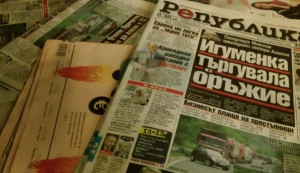Censorship Issue: Bulagaria’s not so Free Press
Bulgaria has the lowest level of press freedom of any European country according to this year’s Reporters Without Borders Press Freedom Index.
This widely accepted measure of how free the world’s media are, described the small Balkan state as a country “whose promise of reform came to nothing and where the internet ceased to be a safe place for freelance journalists.”
Earlier this month, the then Bulgarian Prime Minister, Boyko Borisov reacted to the publication of leaked files about his business activities during the 1990s with a warning to journalists.
“What they have done,” he said, “I can cook it for all of you standing here today. I can order the secret services to launch similar cases for all of you journalists, all of you without exception.”
Why should the rest of Europe be concerned with the affairs of our small European neighbour? The European Commission published a report in January stating that “a free and pluralistic media is crucial for European democracy. But there are currently a number of challenges which can potentially restrict journalistic freedom throughout Europe.”
“There is a kind of domino effect going on here,” said William Horsley, chairman of the Association of European Journalists UK section.“Annual reports for Bulgaria, Romania and other countries, before they joined [the European Union] were quite rigorous.”Bulgaria, one of the latest countries to join the EU, had to meet certain criteria, political, economic and legislative to become a member of the Union.
“Once they were inside,” he continued, “those things didn’t count and it was more or less a free for all. Now you have this fusion so to speak, of political and media power corrupting the flow of information and of course, one country’s problems reinforce others.”
In 2008, a year after Bulgaria joined the EU, a journalist who wrote about the country’s criminal underworld, Georgi Stoev, was gunned down on the street in the capital city, Sofia.
Since joining the EU in 2007, Bulgaria has been the lowest-ranked EU member in the Reporters Without Borders Press Freedom Index. When applying for EU membership, the country was ranked 35th, joint with France and above Italy, Spain, Poland and Romania.
Since then it has remained firmly at the bottom. Georgi Stoev’s death is an extreme example of persecution of journalists in Bulgaria. Today, “the main things [affecting journalists] are ownership, a lack of transparency and the shrinking media market,” said Julian Popov, a Bulgarian writer and journalist based in London.
“Because the media in Bulgaria is very poor on the basis of its own income, it always depends on something else. So it’s always used by the owner or by somebody else through advertising and this is a way state or local media for instance would deviate seriously from objective reporting. But the issue of media freedom in Bulgaria is so complex, there is no one point to focus on,” he said.
Venelin Petkov, a prominent news anchor for Bulgaria’s first private TV station, bTV, says journalists feel all kinds of pressure, which may be why their freedom rating is so low.“Because there is pressure, there is self-censorship, there is fear that you might lose your job if you do it the way you should. That’s a simple explanation, but you do have pressure.You should always expose the wrong sides of whatever politicians are doing. In this country [Bulgaria] you don’t always get that. People want to see real journalism, people want to see an investigation, people want to see many sides of the story and a lot of the time, those are not there, you just see one side.” Said Mr Petkov who is surprisingly open with his response, as many journalists in Bulgaria are afraid to answer questions on media freedom.
Svetlana Bozhilova, professor of journalism at Sofia University, said that this is because the professional journalism unions in Bulgaria are poor at defending journalists.“The journalists rely mostly on themselves to survive, including the youngest ones and this generates answers like: ‘I don’t have the right to answer questions on freedom of speech. Graduating from the Faculty of Journalism and Mass Communications, our students go straight into television stations and they say they can’t do what they want as journalists. And this is my greatest pain.”
The Association of European Journalists (AEJ) 2012 Freedom Report for Bulgaria expressed concern at the “intolerable pressures on journalists’ independence” and “violent assaults and intimidation”. They state a case where one journalist, Spas Spassov, received a copy of Sun Tzu’s Art of War with a note quoting the book: “You had better avoid those with whom you cannot make friends, and neither can you conquer them.” The note was signed by Marin Mitev, a co-owner of TIM Holding, one of Bulgaria’s most powerful economic groups, linked to a controversial investment project that Mr Spassov had been reporting on.“There are several similar cases.”
Mr Horsley said: “I think the European Commission and the European National Governments have turned a blind eye, very stupidly, to a growing problem which is not only confined to South East Europe but is centred there. Until recently this felt like a contained problem, an occasional problem, now it does look as though the whole legal framework for protecting fundamental rights, freedom of expression and particularly press freedom are shot to pieces.”
He continued: “This collusion between political and media forces, combined with thugs or hired hitmen, intimidating journalists and sometimes killing them, sending them threatening messages, trying to put them off investigating corruption because of business or political interests will make Bulgaria sink into a worse morass of corruption and of restrictions on press freedom.”

























